Can Akhilesh Yadav win back 222 million Indian voters?
- Published
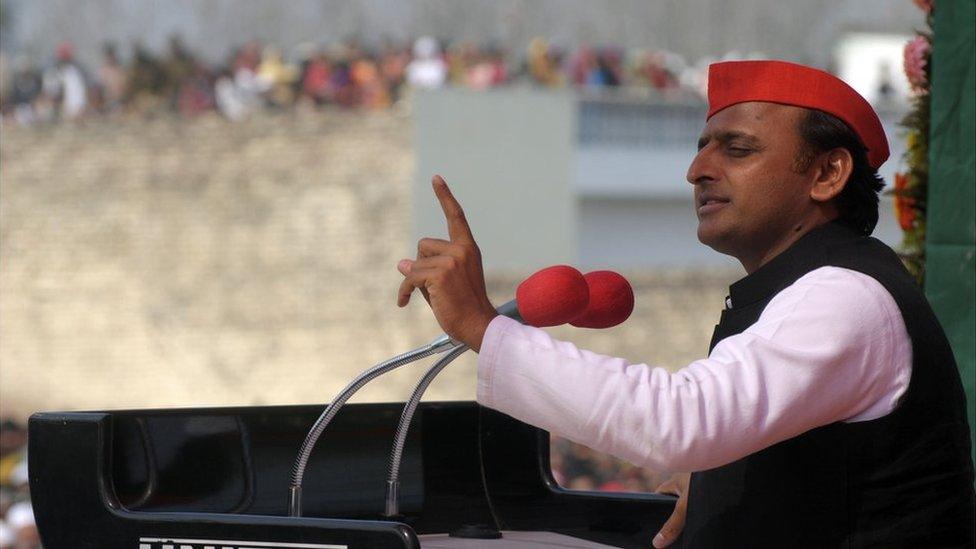
Akhilesh Yadav takes on his political rivals with humour and sarcasm
Five years after Akhilesh Yadav led his regional Samajwadi Party to a spectacular win in the politically crucial Indian state of Uttar Pradesh, he is seeking an encore in the ongoing assembly elections in the country's most populous state. The BBC's Geeta Pandey recently spent a day travelling with him in his helicopter, as he hopped from one rally to another.
As our helicopter circles over the packed rally ground in a dusty village in western Uttar Pradesh, Mr Yadav is visibly pleased. "Look at that crowd, it's a good turnout," he tells me.
His political journey, however, has been far from smooth, especially in the past few weeks when he fought a very public battle with his father, party chief Mulayam Singh Yadav.
As his diminutive figure emerges from the helicopter, waving and smiling, frenzied supporters cheer him lustily, shouting "Akhilesh bhaiya zindabad [long live brother Akhilesh]".
The chants continue as he walks to the stage, party leaders garland him and shower him with flower petals, supporters wave flags, and victory signs are flashed. Many in the crowd push forward to get a better look at him.
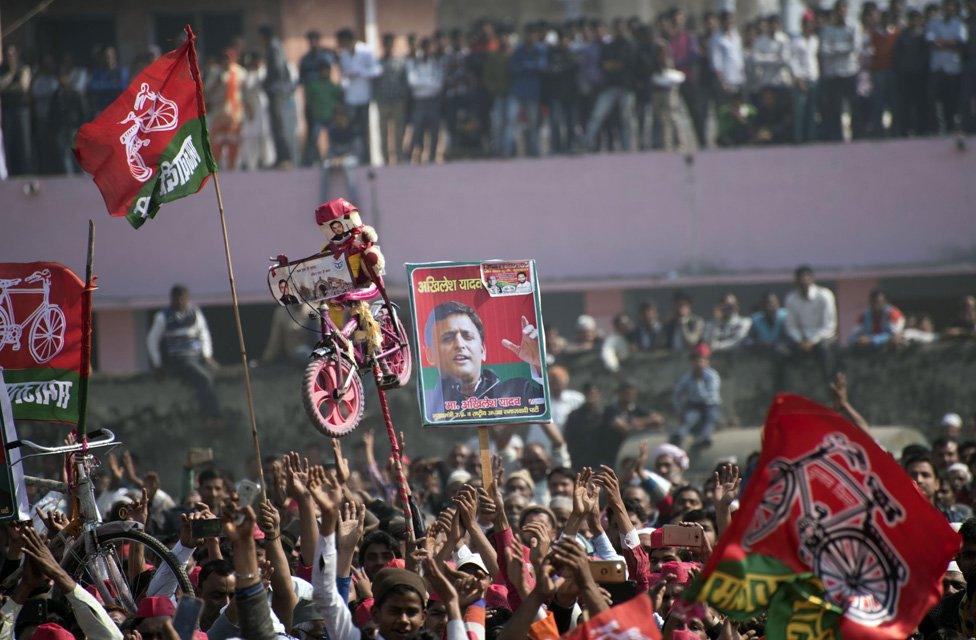
Mr Yadav's youth and clean image are helping to keep his personal stock high
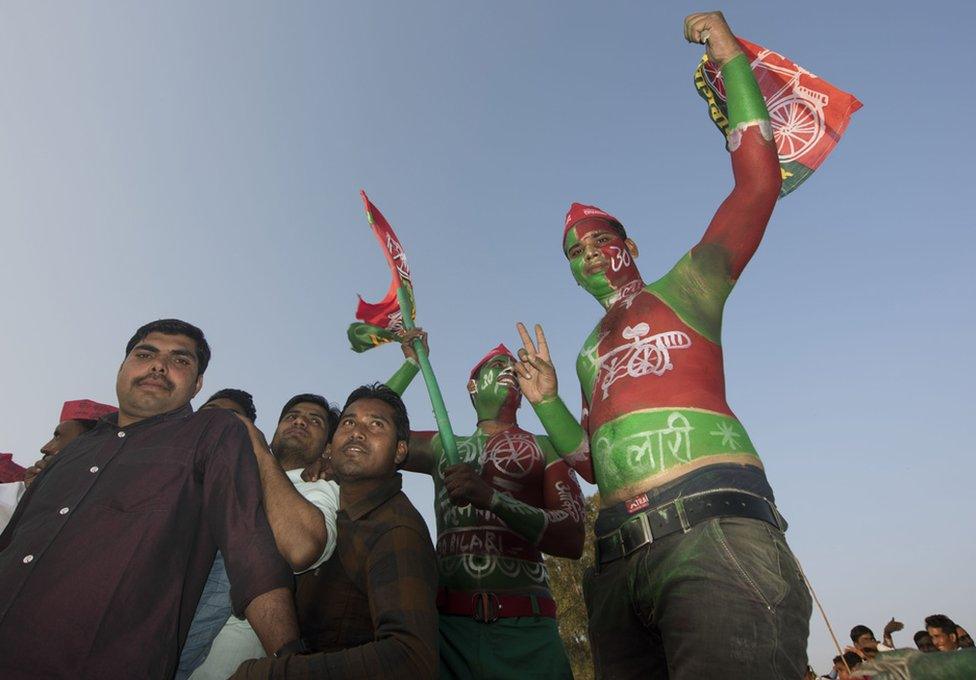
However, his Samajwadi Party has not been able to shake off the impression that it's a party of goons
The scorching sun beating overhead doesn't seem to bother the thousands who have been waiting for several hours to hear him.
Speakers before him describe him as "hamare dil ki dhadkan" (our heartbeat) and "hamari umeed" (our hope).
In his speech, he lists the "achievements" of his government and the work he's done to develop the state - the road network he's built, the free laptops that have been distributed amongst students, the pension scheme that covers 5.5 million poor women and the 16 hours of daily electricity being provided to rural areas, with a promise to extend it to 24 hours if he's re-elected.
The mostly young audiences clap loudly when he promises free smartphones for the youth.
Critics say that his supporters are lawless and that his is a party of goons.
Mr Yadav takes these allegations head on. "We've addressed the issues. We've improved policing, we've introduced a helpline for women, we've chosen women as candidates."
His speech is laced with humour and sarcasm as he takes on his political rivals - the Hindu nationalist Bharatiya Janata Party (BJP) and the regional Bahujan Samaj Party (BSP).
The BJP has not nominated a chief minister candidate and is banking on the charisma of Prime Minister Narendra Modi who is campaigning extensively in the state. The BSP is led by Dalit icon Mayawati, a four-time chief minister of the state.
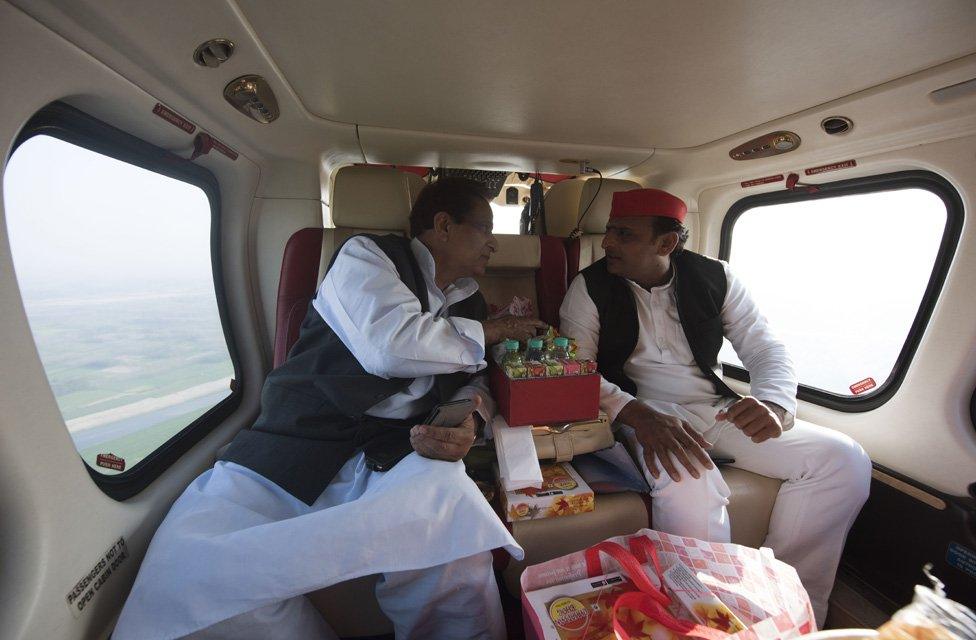
On most days, he has been addressing at least half a dozen rallies
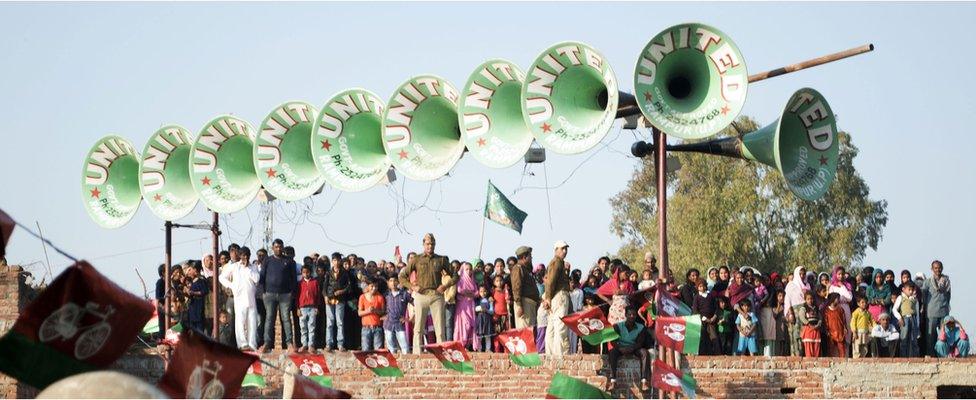
Crowds fill up the surrounding terraces and roofs
The election is being seen as Mr Modi's biggest electoral test since he swept to victory in India in the summer of 2014 - it is also being seen as a referendum on his recent decision to ban high value banknotes.
It's a topic Mr Yadav never fails to raise. "The prime minister said he would put 1.5m rupees in each of your bank accounts when he gets the black money. Did that happen," he asks? The crowd answers with a loud "no" and a man shouts back, "We didn't even get 15 rupees."
He talks about the baby who was born in a bank as his mother stood in a queue to withdraw money. "No one helped her except us. I gave her 200,000 rupees," he says, to loud applause.
A win in the election is crucial for Mr Yadav - it will help cement the 43-year-old as the undisputed leader of the Samajwadis.

Why Uttar Pradesh (UP) matters
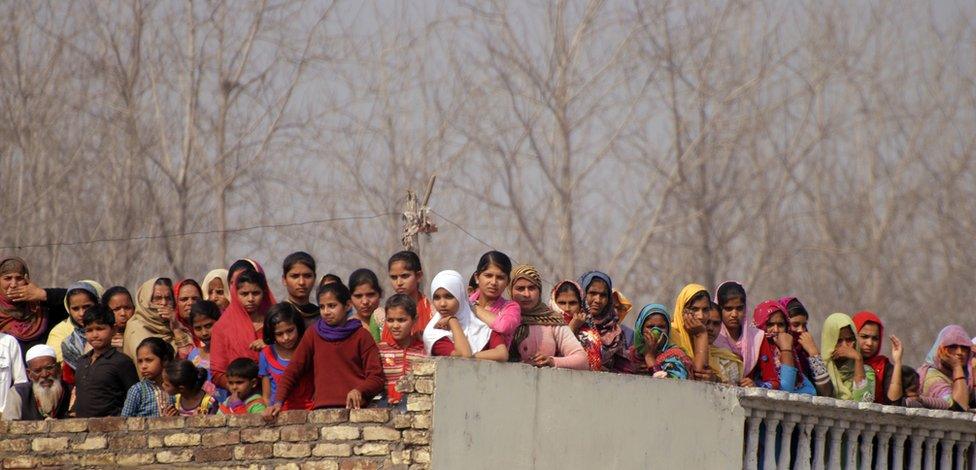
The state is India's most populous with more than 222 million people - if it were a separate country, it would be the fifth largest in the world, after China, India, US and Indonesia.
It sends the largest number of 80 MPs to India's parliament.
Several of India's prime ministers have come from here.
Prime Minister Narendra Modi chose the city of Varanasi in the state to make his parliamentary debut in the 2014 general election.

It will also vindicate his decision to forge an alliance with India's main opposition Congress party. Mr Yadav says the alliance will attract secular people, the youth and the minority Muslim community, but some senior party leaders, including his father Mulayam Singh, have questioned the rationale behind the tie-up.
The family feud has also hurt his campaign, coming so close to the polls. He tells me that he had planned to travel the entire state in a campaign bus, but had to abandon the idea since he ran out of time. Also, his father and uncle, two of the biggest party leaders, are no longer campaigning.
But it has also helped him - over the past five years, critics said Mr Yadav was just a figurehead and the real power lay with his father, uncle and other senior leaders. He has now been able to blame much of the negativity of the past five years on them.
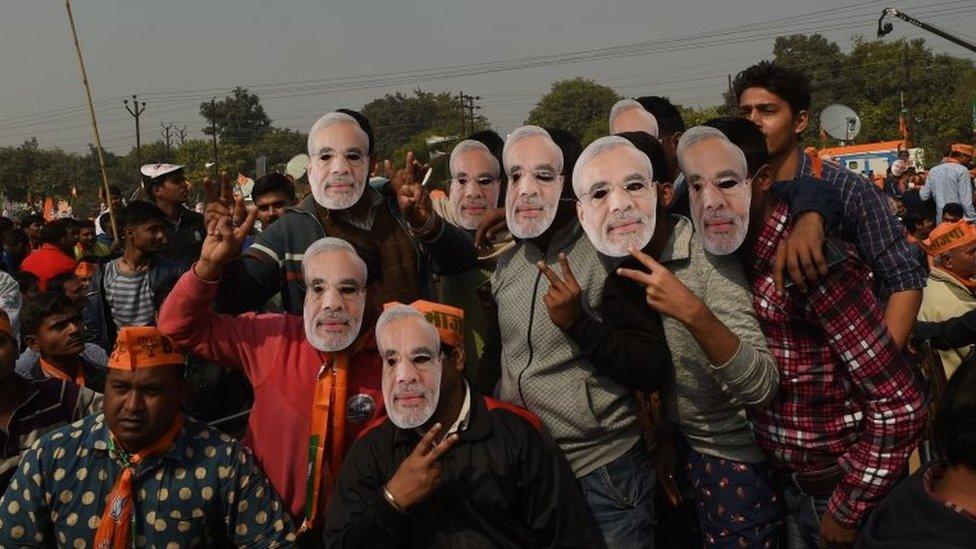
The election is being seen as PM Narendra Modi's biggest electoral test since he swept to victory in India in the summer of 2014
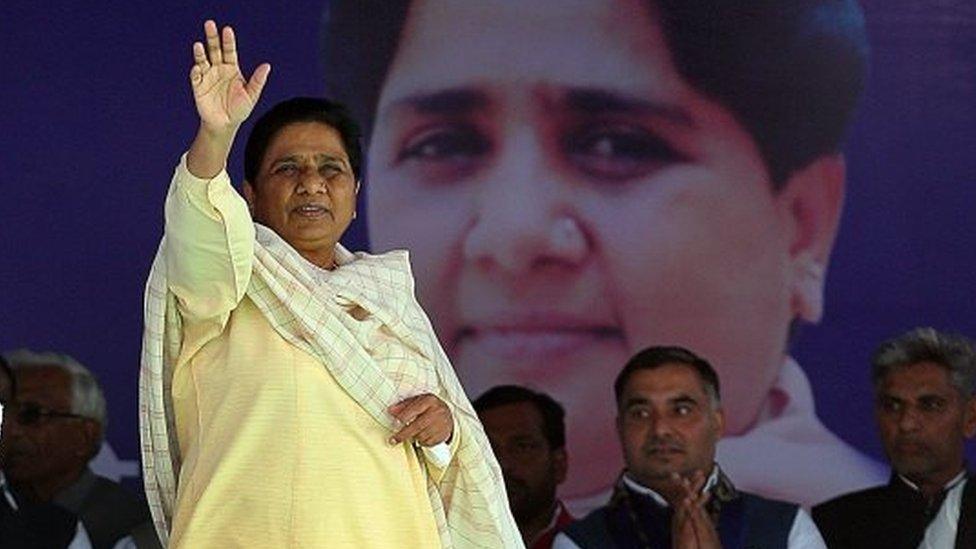
Bahujan Samaj Party leader Ms Mayawati is trying to return to power in the elections
In a presidential-style campaign, the party is projecting him as the leader working for the development of the state. His election catchphrase "Kaam bolta hai" (work speaks), his youth and his clean image are helping to keep his personal stock high, so much so that even his political opponents describe him as "well behaved and well mannered".
At one of the rallies, I walk away from the stage to talk to his supporters.
Daily wager Bhura (who uses only one name) says he will vote for Mr Yadav since "he's built lots of new roads", college student Samir Khan because "I got a laptop from his government", and farmer Shishupal Singh Yadav for introducing farmer friendly schemes, "when my wheat crop was ruined in 2015 due to unseasonal rains, the government paid me compensation."
At dusk as he wraps up his day-long campaign, and as we head back, he tells me his big theme in the past five years has been road building.
"I believe in double the speed, triple the economy," he says. "It's said that America built the roads, and roads built America. I want to connect every city in the state to the capital, Lucknow, so that you can reach there within five hours from wherever you are."
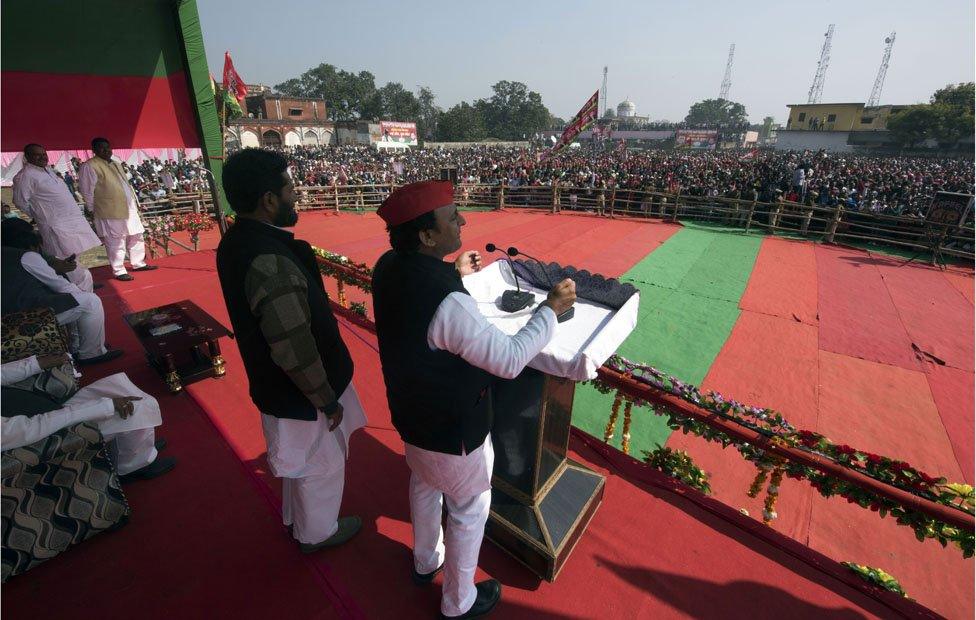
His election catchphrase is "Kaam bolta hai", or work speaks
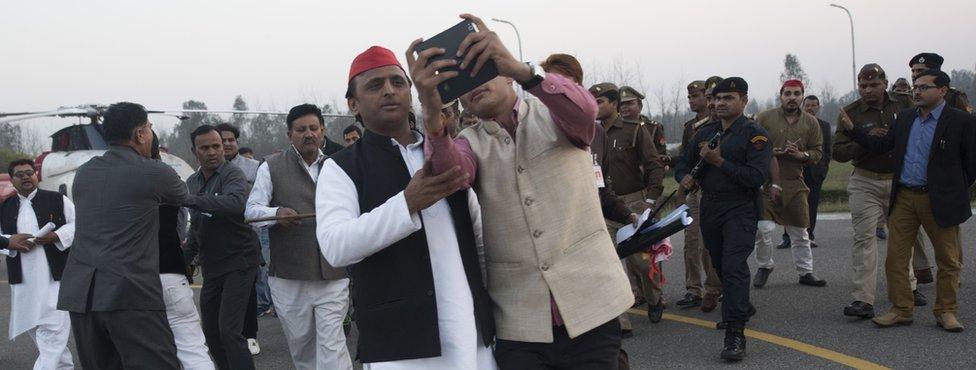
A supporter takes a selfie with Mr Yadav
I ask him how he rates his chances in the polls? "We will win at least 300 [of the 403] seats," he says confidently.
As we descend over Lucknow airport, I ask him what his evening plans are?
There's official work to be done, then he has to meet party leaders and workers, there's time to be spent with his MP wife and their three children.
"Politics is not easy, not everyone can survive here. You need hard work, and then you need luck," he says.
He's doing the hard work. Now all he needs is some luck.
- Published8 February 2022
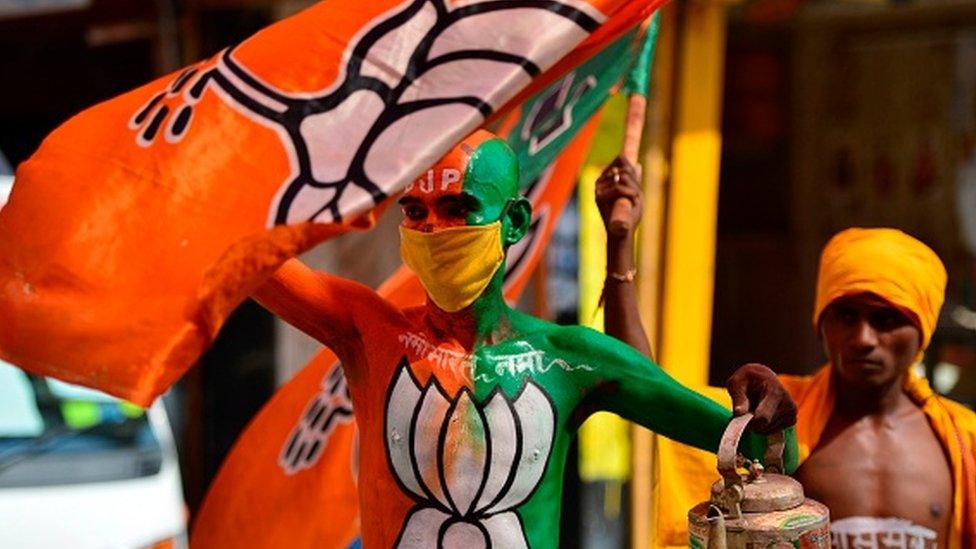
- Published15 February 2017
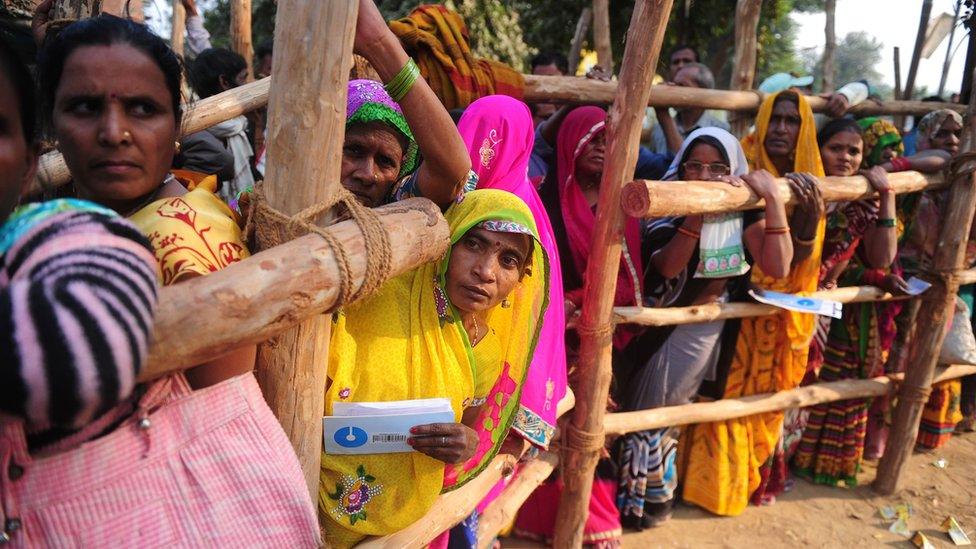
- Published13 February 2017
